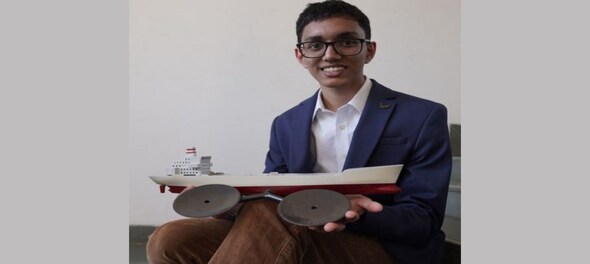
Earth is our home. Several factors are causing the climate to change and immediate action is needed to stop global warming from getting worse. While governments across the globe, hold meetings, discuss ways to combat climate change and take action on the same, many people, even children, on an individual level are also doing their bit.
Seventeen-year-old Haaziq Kazi is also doing the same. Kazi's journey began in Class IV when he watched a few documentaries regarding the plastic waste crisis and how it was impacting the planet's marine ecosystem and oceans. "It really horrified me," he said.
At 12, he designed a prototype of a ship that would help clean the ocean and named it ERVIS. Kazi got the inspiration for its design from home. "I saw the concept of a sink. The whirlpool going down the sink and I thought why we couldn’t just use a similar concept to such in the waste. Kind of like a sink in the ocean which will capture all of the waste," he said.
Using this concept, he designed ERVIS. The design comprises a huge ship, which runs on hydrogen, with multiple saucers surrounding it to create the same whirlpool effect of a sink, capturing all the plastic, and then it goes through the tubes under the saucers and it filters out the plastic based on its size and type. According to the prototype, the plastic, oils and waste are then segregated inside the ship for compact storage and also analysis of the waste.
Since designing the ERVIS prototype, while he was in school in Pune, Kazi has gone on to become a TED-Ed and TedX speaker and also started the ERVIS Foundation, which is also registered and aligned to the UN sustainable development goals - 12 & 14. The foundation helps educate and spread awareness about the threats the marine ecosystem faces and also provides youngsters with a platform to express their environmental ideas as well as concerns. It hosts numerous workshops, including short-term education initiatives in schools to help make children aware of the threats the marine ecosystem faces.
“There are countless kids like me who want to do something about this problem but unfortunately they may not have the platform to do so. We focus on education and the incubation of their ideas. We are focusing on the youth and how we can create a generational impact on how the youth of today deals with the marine ecosystem and plastic pollution,” he said.
Apart from plastic waste, Kazi is now also focusing on all the other issues that the marine ecosystem faces. He speaks about one of them – sargassum. “It is this algae, which now is seeing a bit of bloom. A lot of sargassum has been depositing in countries like Mexico and the US as well and I think a bit in India and in countries in Africa," he said.
Kazi, who is now studying in the US, said he recently flew down to Mexico to look at how the local community is dealing with the algae bloom issues. "It is affecting tourism and even the local ecosystem. Too much of anything is bad," he said.
Kazi said sargassum accumulates a lot of toxic metals such as arsenic, chromium, and a lot of pesticides as well. "It's a problem that is not very well known, just like plastic was a few years ago. So hopefully, I can also work on this relatively unknown problem and help focus on future relief to solve it," he said.
As the planet observes World Environment Day on June 5, the theme for the same this year is 'solutions to plastic pollution'. It is a reminder that people's actions on plastic pollution matter.
In April this year, National Geographic had highlighted the efforts of youngsters such as Kazi and five others who had been consciously working towards planet conservation and have debunked the myth that children are too young to drive a change, as part of documentary films under its 'One for Change' campaign.
"This journey towards fighting for the oceans and against plastic started with a documentary I had watched. So, it was fitting that I work with Nat Geo to spread this message," Kazi said.
Haziq also said he has a message for youngsters like him who want to bring about a change. "They should just go for it. Not worry too much about 'if I can do this'. Don't focus on making the next huge project. Start small. Try to bring about that small change. And as long as you try, who knows you might succeed," he said.
First Published: Apr 21, 2023 2:02 PM IST
Check out our in-depth Market Coverage, Business News & get real-time Stock Market Updates on CNBC-TV18. Also, Watch our channels CNBC-TV18, CNBC Awaaz and CNBC Bajar Live on-the-go!


View | Congress manifesto vs BJP's wealth redistribution narrative — is it something out of nothing
May 2, 2024 9:10 AM
Two days left for filing nomination, Congress undecided on candidates for Amethi and Rae Bareli seats
May 2, 2024 7:32 AM
Lok Sabha polls: Polling time in Telangana increased by an hour, here's why
May 2, 2024 6:55 AM

